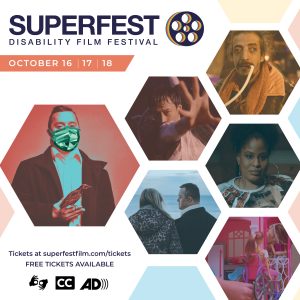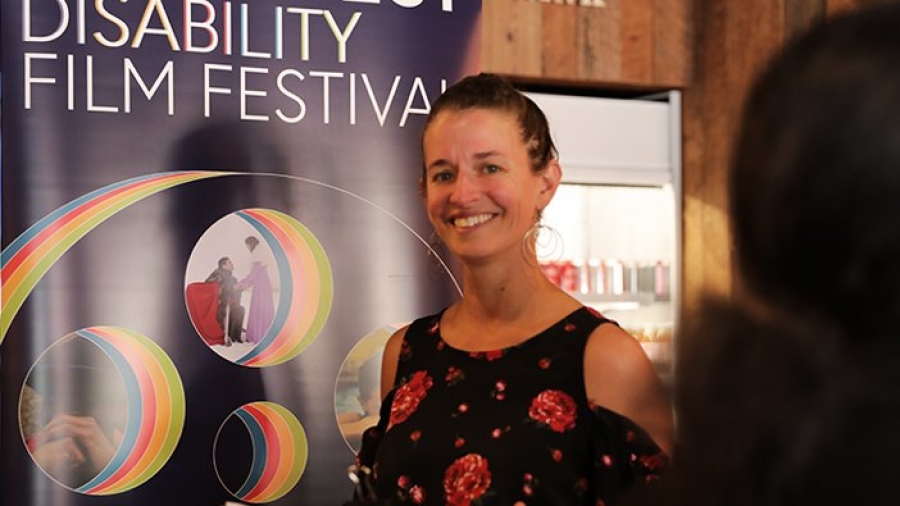Written by Tasnia Habib
Superfest Disability Film Festival, based in San Francisco, is celebrating its 34th year with an online film festival. Superfest is one of the longest running disability film festivals in the world. It screens films that show the nuances in living with disability and are primarily made by disabled filmmakers. Emily Beitiks, the co-director of Superfest, discussed how Superfest aims to screen films that take a step further, beyond just creating awareness about disability.
“Our work is about Disability 201 because we’re in the Bay area where there’s a vibrant disability community, and we imagine that as our primary audience,” said Beitiks.
Beitiks includes films that have disability friendships, that show the marginalization inside the disability community, and films about struggles to fight discrimination and make social change as part of their “Disability 201.”

Still from Sound of a Snail Eating.
Superfest celebrates films that show disability as a creative force in cinema. “Disability aesthetics and disability concept of time and access features like audio descriptions can really impact what a film is like in really creative, beautiful and exciting ways,” said Beitiks. One of the films screening this year is The Sound of a Wild Snail Eating, which received the P.K. Walker Innovation Craft Award at the festival. The film is based on a memoir about a woman who is chronically ill and bed-ridden and receives a snail to keep her company. It features long scenes of a snail eating, showing how time can slow down for people with disabilities. “I love it as an example of a real disability aesthetic and what that can bring to filmmaking,” commented Beitiks.
Beitiks believes that film festivals are responsible for participating and leading the conversations in social justice movements. In light of the Black Lives Matter movement, Superfest kicked off with a screening of The God Given Talent, a film about Charles Blackwell – a Black blind poet in Oakland. The screening was followed by a panel of all Black, disabled industry professionals speaking about representation in the film industry. “We have always been committed to an intersectional approach to disability; we are looking for and seeking out stories that feature those marginalized within the disability movement,” Beitiks explained.
 Superfest is among many film festivals that have moved to an online event due to COVID-19. Beitiks noted that the need for online programming has been articulated by the disability community for many years. For many people with disabilities, in-person events are always inaccessible. “There’s a certain ‘I told you so’ moment happening for people who have fought long and hard for virtual programming,” said Beitiks. In March, Superfest held a mini online film festival to bring the community together. This event had a larger attendance number than ever before and many organizations reached out to Superfest on how to have a successful online film festival. In transitioning to an online film festival, Beitiks said: “Because of our help and guidance that we received previously from the disability community pushing us to do this early we’re well positioned to make that transition happen.”
Superfest is among many film festivals that have moved to an online event due to COVID-19. Beitiks noted that the need for online programming has been articulated by the disability community for many years. For many people with disabilities, in-person events are always inaccessible. “There’s a certain ‘I told you so’ moment happening for people who have fought long and hard for virtual programming,” said Beitiks. In March, Superfest held a mini online film festival to bring the community together. This event had a larger attendance number than ever before and many organizations reached out to Superfest on how to have a successful online film festival. In transitioning to an online film festival, Beitiks said: “Because of our help and guidance that we received previously from the disability community pushing us to do this early we’re well positioned to make that transition happen.”
As a disability film festival, Superfest prioritizes accessibility options for their audiences. All films at Superfest are required to have audio descriptions and embedded captions. Ticket holders have the option to turn on audio descriptions for all films screened. Some of these access features are easier to do online rather than at an in-person event. “At the end of the day, it’s really more accessible rather than less.”
Access features such as audio descriptions often increase accessibility for all audience members, not just people with disabilities. Although virtual film festivals can now reach a global audience, they may be inaccessible to those who do not have high speed internet. In this scenario, virtual film screenings with audio descriptions can provide access to this audience. “You can use any phone to call in and experience a film as a blind person would, said Beitiks. “The audio description track will provide visual cues of anything happening on screen and it provides people access.”
Beitiks hopes that other film festivals start to use audio descriptions to become more accessible. She has worked with other institutions such as museums to help add accessibility options. Beitiks encouraged other film festivals who are looking to become more accessible to contact Superfest, as they are more than willing to share information. She suggested that film festivals start small, rather than being daunted by the idea of becoming fully accessible. For example, a festival can start by offering one day, a few screenings throughout the festival, or accessible screenings where people can request accommodations.
“It would make a huge difference for showing we’re there, we’re trying to do the work, and we want to do more,” encouraged Beitiks, “So we can start to see these institutions that have been really inaccessible, start to make progress.”

